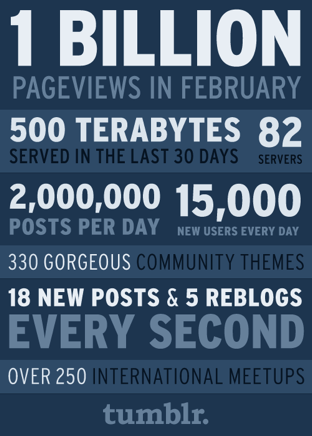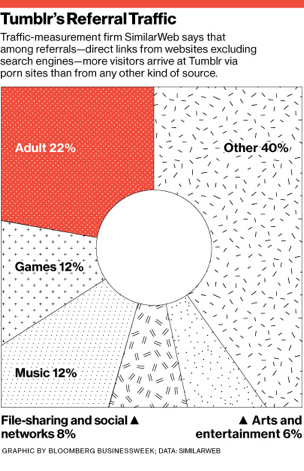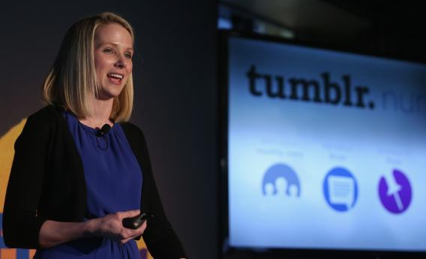A week ago, Yahoo!’s CEO Marissa Mayer confirmed that the rumors were true: Yahoo! had in fact purchased the microblogging site Tumblr for the tidy sum of $1.1 billion. The acquisition is the next strike in the perennial arms race between Google and Yahoo! (though neither company will admit to being in a war), and a bid to stay up to date with today’s internet-loving youth (the majority of Tumblr’s 300 million monthly visitors are 18-24 years old). Here are some quick stats:
With the purchase, though, come a few very pertinent questions. It’s no secret, or at least not a very big secret, that Tumblr is the home of massive amounts of adult content. Porn, to be blunt. That content by no means accounts for everything on Tumblr, but it’s a pretty big part of it, to the tune of several million adult blogs out of the 50 million or so total blogs on the site. Not a majority by any means, but you also have to factor in the sway of traffic. According to this infographic from Bloomberg Businessweek, with data from SimilarWeb, 22 percent of the sites linking to Tumblr are adult oriented, and that accounts for the highest single source of traffic on the site (the 40 percent “Other” is a conglomerate of various sources).
Advertisers Vs. Porn
Nobody has officially stated this, but it stands to reason that there’s only one reason Yahoo! would be interested in Tumblr, or any site for that matter: Traffic, aka visitors to the site. And the only reason any media giant is interested in traffic is to convince advertisers to partner with them.
And that leads to a very delicate problem: Yahoo! wants advertisers interested in Tumblr. Tumblr has a lot of porn. Advertisers don’t typically want their products promoted beside porn. What will happen to the porn?
Until this point, Tumblr has had a very specific formula serving ads to their users, and so far it’s been working—ads appear on user dashboards, which show updates from blogs they follow similarly to the News Feed on Facebook. That means there aren’t ads on the blogs themselves, which limits the chance that an advertiser’s product will end up sandwiched between a string of pornography. A user might follow some porn blogs, in which case it could happen, but in those cases it’s an opt-in scenario—the user knows he (or she) will be seeing nudity, and is less likely to associate an advertisement with a negative connotation. In other words, they won’t be surprised to accidentally stumble onto an adult page, and forever after associate Puma shoes with sex, for example.
What Will Yahoo! Do?
In her announcement, Yahoo!’s Marissa Mayer stated, “We promise not to screw it up.” They clearly know they’re in danger of treading on beloved territory. They have, after all, purchased no less than ten other companies so far in 2013, including online gaming company Loki Studios and the productivity app Astrid.
With all of that in mind, we have two reasons to believe that Yahoo! won’t do anything drastic to clear Tumblr of its porn cache, at least not immediately:
1- Yahoo! already states in their terms of use that users may come across pornographic content. While Google scrubbed its search results of NSFW content in late 2012, Yahoo! has taken no such actions. Why should they do anything different for Tumblr, especially with so much money on the line?
2- Tumblr’s founder and CEO David Karp is remaining on board to spearhead the new Tumblr, whichever direction it takes, so it’s safe to assume that he’ll be adamant about keeping his original fanbase happy, and in a lot of ways, that means keeping Tumblr’s porn franchise running strong.
What do you think Yahoo! should do in this situation?
About Ali Gajani
Hi. I am Ali Gajani. I started Mr. Geek in early 2012 as a result of my growing enthusiasm and passion for technology. I love sharing my knowledge and helping out the community by creating useful, engaging and compelling content. If you want to write for Mr. Geek, just PM me on my Facebook profile.




















